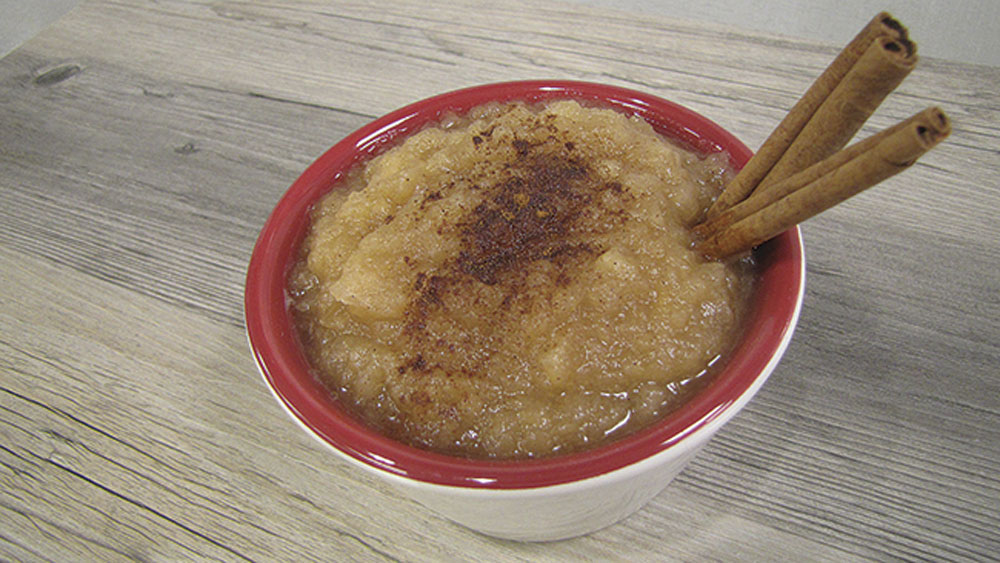PrairieFare: 5 questions about cold temps and our health
Do you know how to take care of your skin during cold weather?

Submitted Photo Try this slow cooker applesauce recipe as a snack, dessert or topping for pancakes. (NDSU photo)
One morning my eyes snapped open at the sound of a familiar rumbling engine outside my window.
I glanced bleary eyed at my alarm clock. The time was 5:25 a.m.
I thought my neighbor was snow blowing. However, the sound was directly under our window.
I usually do not jump up at such an early hour. However, I knew my husband was engaged in snow blowing.
I needed to stop that man. He still is recovering from shoulder surgery.
Somehow, I was in full North Dakota winter attire by 5:30 a.m., stomping across the driveway to take over the controls.
Yes, we could have been featured on an episode of “Dr. Phil” or some other reality TV program about sparring spouses.
He surrendered the snow blower controls reluctantly. I agree that his snow removal skills exceed mine by a long shot. However, I did not want his surgery recovery to go on forever.
I put the snow blower in gear on the “turtle setting” and off I went. Unfortunately, I could not figure out what direction the wind was blowing to gauge how to point the snow chute.
I got a little bored with the “turtle” setting and changed it to “rabbit.” Big mistake. Most of the snow was ending up on me, mostly in my face.
I paused to go back inside and wrap my head in a large scarf. I finished the driveway, the sidewalks and our neighbor’s driveway just to show that I could do it.
I think my husband found the situation more than a little amusing. He watched a living, breathing snowwoman with frozen eyelashes stagger back to the house. I thought my red face was frozen.
Snow removal is essential in our world. Cold weather and snow can be dangerous to our overall health. Try these questions to see know about taking care of your skin during cold weather.
This dangerous condition may follow prolonged exposure to cold temperatures or can result when people become damp from cold water or sweat. The person might be shivering, exhausted, tired and/or confused. What is the name of the condition?
If you find someone with the conditions from question No. 1, what are at least three things you should do right away?
You noted your toes have white or grayish, waxy looking areas and are numb after being outdoors without proper boots. What is the name of this condition?
If you note that someone has the symptoms from question No. 3, what are at least three things you should do right away?
What types of beverages are best for warming up after being outside?
Here are the answers and a little more detail based on information from the Centers for Disease Control and Prevention.
Hypothermia brings on shivering, exhaustion, confusion, memory loss, slurred speech and drowsiness.
If you suspect someone has hypothermia, get medical help right away. Move the person to a warm room or shelter. Be sure to remove wet clothing, then use blankets or other layers to warm the person. An electric blanket is ideal. In severe conditions, begin CPR and continue until medical help is available.
Frostbite is an injury to the skin that usually affects the nose, ears, cheeks, chin, fingers and toes. In the worst-case scenario, amputation could result.
If someone has frostbite, follow similar care to those with hypothermia. Avoid walking on frostbitten feet. Move the person to a warm area. Place the affected areas in warm but not hot water. If fingers are frostbitten, warm them under your armpits. Avoid using a heating pad, heat lamp, radiator or other device that could burn the skin.
Cold or warm beverages will hydrate us after being outside in cold weather. However, warm beverages are comforting and, potentially, warming after coming in from snow blowing, skiing or sledding. Try some cocoa, hot cider, herbal tea or broth-based soup. Avoid beverages that contain alcohol.
Most health experts also suggest steering clear of caffeinated drinks such as coffee, tea and cola beverages. Alcohol and caffeine affect heart rate and can promote worse effects, especially with medical issues such as frostbite or hypothermia.
Slow Cooker Applesauce
8 medium apples (about 3 inches in diameter)
Juice from 1 lemon (3 Tbsp.)
1 tsp. cinnamon
2 Tbsp. brown sugar (adjust to preferences)
1/2 c. water
Peel and core apples; cut into quarters. Add apples, lemon juice, cinnamon, brown sugar and water to a slow cooker; stir. Cover and cook on low four to six hours, until apples are very tender. Mash with the back of a fork or potato masher.
Makes eight servings. Each serving has 70 calories, 0 grams (g) fat, 0 g protein, 19 g carbohydrate and 2 g fiber.





